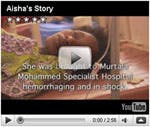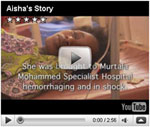The Best Empowerment? Birth Control.
Apr 28, 2022
First story


“I was bleeding and I wasn’t sure if I would lose the baby,” Margaret, a 50-something school teacher and grandmother in rural Kenya, said as she leaned forward to pass tea to me and the three other women who sat in her small, well-kept living room. Her guests clucked and gasped sympathetically as their cups were filled. I nodded, encouraging her to continue her story, while struggling to balance the scalding, sugared tea and take notes.
“I walked to the doctor to see what was wrong,” she continued. After several other pregnancies, Margaret then 36, felt something was different. A few months into the pregnancy she had experienced unusual bleeding. She walked to a local doctor who gave her injections to strengthen the uterine lining. The bleeding stopped, but something still seemed wrong. Over the next few months, her belly did not grow as she expected and she felt no movement. Her husband, who was suspiciously absent during much of her pregnancy, told her not to worry and to “just wait it out” when she asked if she could go to another doctor. He did not want to pay for any additional visits until she was due.
But Margaret knew something was not right. Her stomach started to hurt and was painful to the touch. She developed a fever. One day when her husband was out, she gathered the little money she had saved on her own and set off for Nairobi—a bumpy, five hour drive in a crowded matatu (the equivalent of a VW van). Feverish and gripped with pain, she managed to survive the ride and made it to a hospital. There, doctors told her the fetus had been dead for quite some time and that she was suffering from a severe infection.
“I delivered a bag of bones,” Margaret said without tears, without emotion. Just a statement of what she had experienced all those years ago. Painful yes, but something over which she could no longer worry—she’d done all she could.
My hand shaking, I struggled to steady my cup of now nearly-cold tea. Margaret’s words lingered in the room and I felt the full devastation of her story in a way only a younger woman, whose only knowledge of pregnancy and childbirth was rosy and optimistic, could feel.
I could never have imagined stories such as Margaret’s before I traveled to Kenya several years ago. There studying women’s micro-lending groups during a semester abroad, what I discovered went far beyond exploring how women’s groups contributed to economic development. As I sat in meeting after meeting of women discussing their weekly business, accounts of a more personal nature inevitably surfaced. Stories of family members in need or other women in the community struggling were met with sympathetic clicks and hums.
I scribbled furiously on my notepads, determined to find the underlying causes of the women’s financial successes—and sometimes failures. What I realized was that during these “business” meetings, women returned repeatedly to stories about their reproductive health. Over and over again, these successful women would share tragic accounts of lost pregnancies, or times they’d yearned for birth control, or friends whose husbands had been unfaithful and who had consequently been infected with HIV.
Here were real examples of women who, compared to their peers, were economically successful and empowered. Women, who as teachers and business owners, certainly had more options than the average Kenyan. Yet almost all of them had encountered overwhelming obstacles to accessing the sexual and reproductive health care they needed.
There is a long running debate about when to focus on reproductive health. Some argue that lower fertility rates and maternal mortality rates are a natural outcome of women’s economic empowerment. Thus, it’s most important to focus on providing opportunities for income generation and education. Others argue that in order for women to be economically independent they must be able to control when and how often they have children so that they can delay early marriage and childbirth and stay in school.
After hearing countless heart-wrenching stories like Margaret’s during my time in Kenya (and realizing how incredibly fortunate I’ve been as an American woman who has always had access to doctors and contraceptives), I firmly believe that it is critical for reproductive health to be a central component of development initiatives. If empowered, educated women like Margaret can barely access care, what does that mean for women less fortunate?
That belief was one of the primary reasons I began working at Pathfinder International, a nonprofit organization dedicated to improving access to sexual and reproductive health care in developing countries. I wanted to change the options for women like Margaret. I may no longer be in the field scribbling notes, but I continue to hear incredible stories--now of women whose lives have been transformed because they do have access to reproductive health care. Women like Aisha, who, because of a Pathfinder project in Nigeria, survived postpartum hemorrhage after childbirth and women like Jennet, a mother in Uganda who had been longing for years to have a safe way to prevent future pregnancies, and with Pathfinder’s help was able to finally begin using a family planning method of her choice.
By contributing in the small way that I can to Pathfinder’s work, I feel incredible pride that last year Pathfinder supported nearly 18 million family planning and reproductive health service visits and reached more than 104 million people through community education events and training. I may not have been able to help Margaret, but I hope one day, Margaret’s granddaughters will lean forward, passing tea to other women in a large, well-kept living room, and—perhaps with Pathfinder’s help—share laughs and smiles instead of clucks and gasps.




